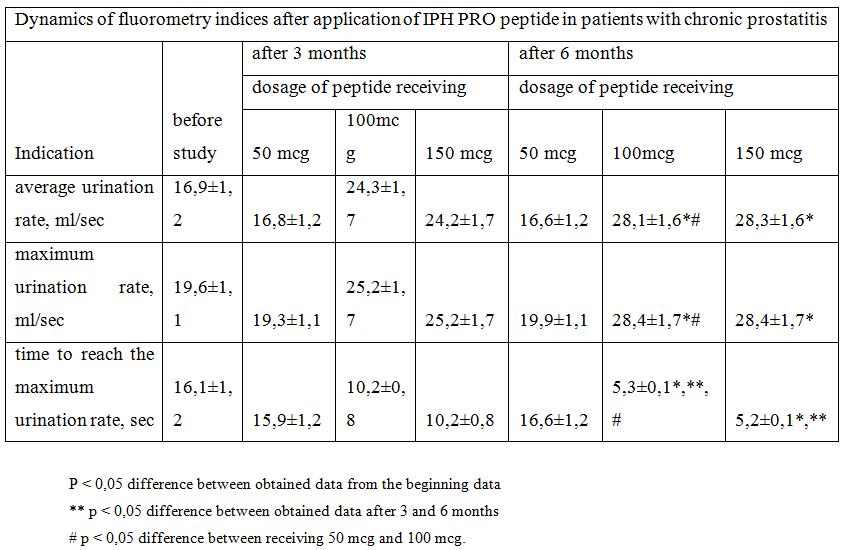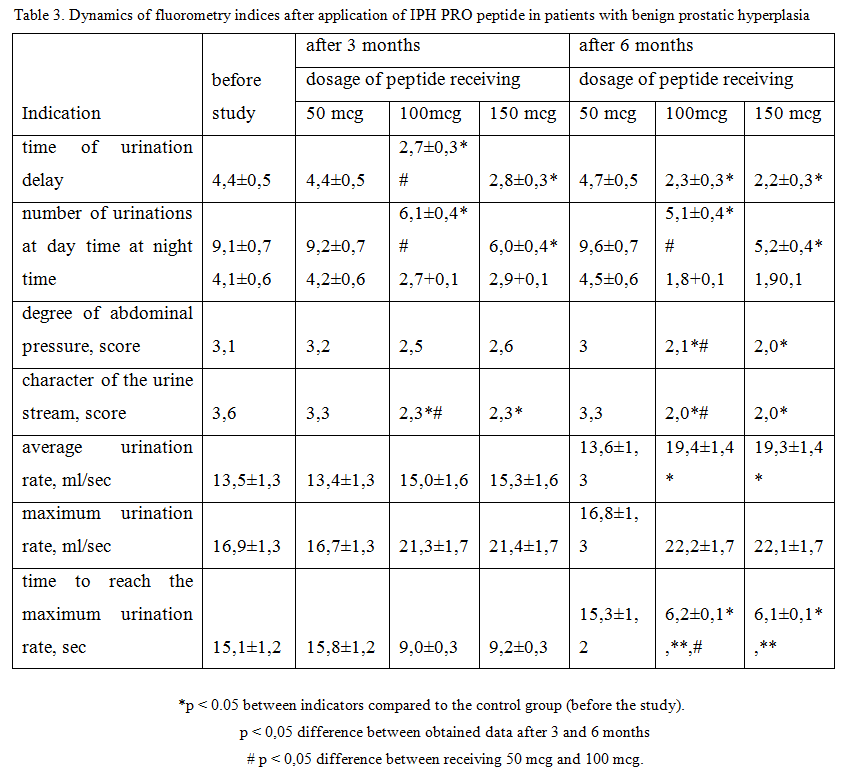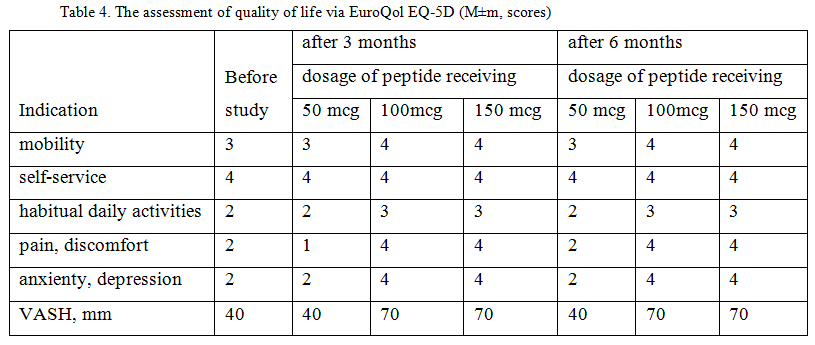Introduction
Peptide IPH PRO contains a complex of low molecular weight peptides and has a normalizing effect on prostate function.
Experimental studies have presented that the peptide IPH PRO regulates metabolic processes in prostate cells, increase their reserve capacity, which suggests the effectiveness of the peptide IPH PRO for the normalization of prostate function in men of different ages with disorder of different genesis.
Prostate diseases currently occupy a significant place among urological diseases, tend to increase morbidity and become increasingly important in the social. According to some authors, more than 70% of men over the age of 50 suffer from prostate diseases, including benign prostatic hyperplasia and cancer. Thus, the search for new effective and safe means for the prevention and treatment of prostate diseases is an urgent task.
No less dangerous for the social life of men is the development of chronic prostatitis. Chronic prostatitis affects more than 50% of the male population. Chronic prostatitis more often affects men aged 20 to 40 years, who are in the period of greatest sexual, reproductive and labor activity, which repeatedly proves not only medical, but also socially significant aspect of the correction of this condition, and hence the search for new means of therapeutic and preventive measures.
Clinical characteristics of patients
57 men have been involved in the study who were diagnosed with chronic prostatitis and benign prostatic hyperplasia. Characteristics of patients are given below.

To assess the effectiveness of the dose of 100 µg (n=57 people) for the studied peptides, we conducted studies on the efficacy of peptides at a dose of 50 µg (n= 55 people) and 150 µg (n=56 people).
All patients were diagnosed and appropriate treatment was carried out in accordant
Characteristics of the study
Peptide IPH PRO was applied orally according to the following scheme: 1 capsule (100 µg peptide) 1 time per day during 30 days, then 30 days break — and repeat the same course for another 30 days, again break 30 days — and the third course for 30 days. The total course was 6 months (3 courses of 30 days and 3 breaks of 30 days).
The dose of 100 µg per day for peptides is chosen as used due to the fact that according to the research of ANNO VO «St. Petersburg Institute of Bioregulation and gerontology» the effective dosage begins with 100 µg, and the increase in the dosage does not affect the degree of effectiveness [Khavinson V. H., Linkova N. S. 2013].
To assess the effectiveness of the dose of 100 µg (n=57 people) of the studied peptides, we conducted studies on the efficacy of peptides at a dose of 50 µg (n= 55 people) and 150 µg (n=56 people).
Evaluation of the effectiveness of the improved management scheme of such patients using the peptide IPH PRO was carried out after 3 and 6 months. The initial data obtained before the study were selected for the control values.
The efficacy of the peptide IPH PRO was evaluated on the basis of the dynamics of patients ‘ complaints, the degree of abdominal pressure during urination and the nature of the urine stream, fluorometric index and quality of life assessment.
Materials and methods
The first part includes 5 components related to the following aspects of life: mobility, self-service ability, activity in everyday life, presence of pain/discomfort and anxiety/depression. Each component is divided into three levels depending on the severity of the problem.
The results of the responses can be presented as a profile of «health status» EQ-5Q-profile, and convenient in the calculations of the quantitative indicator of «health index» EQ-5Q-utility.
The second part of the questionnaire is a visual analog scale, the so-called «health thermometer». This is a 20-centimeter vertical graduated ruler, where 0 means the worst and 100 means the best health. The subject makes a mark on the «thermometer» in the place that reflects the state of his health at the time of filling. This part of the questionnaire is a quantitative assessment of the overall health status.
Statistical data processing
Statistical analysis was carried out using the program STATISTICA 11. The statistical methods of data processing were based on the calculation of the mean absolute and relative values with the calculation of the average error; the significance of the differences between the two sets was estimated using the Student t criterion (the difference was considered reliable at t>2, p<0.05).
Research result
The results of a clinical study of the use of the peptide IPH PRO has presented that pollakiuria (increased urination) completely ceased to bother 73.2% of patients with chronic prostatitis, 88.1% of patients lost the need for night urination. Stranguria (difficult urination) ceased to bother 67.1% of patients, 21.5% of patients noted a marked increase in urine flow and relief of urination (table 2).

It should be noted that the most positive reliable results were found with respect to the time of reaching the maximum rate of urination, which after 6 months of study decreased to 5.3 ±0.1 seconds, which corresponds to the norm.
We have not found any significant differences between the indicators in the application of 100 mcg and 150 mcg for all the studied parameters, which proves the fact that with an increase in the optimal dosage of the peptide used, the efficiency does not increase both after 3 months and after 6 months.
Also, we have not found significant differences between the indicators in the application of 50 mcg and before the study on all the studied parameters, which proves the fact that the effective optimal dosage for the peptide is 100 mcg.
The dynamics of the study results in patients with benign prostatic hyperplasia after 3 and 6 months of use of the peptide IPH PRO is presented in table 3.

Also, we have not found significant differences between the indicators in the application of 50 mcg and before the study on all the studied parameters, which proves the fact that the effective optimal dosage for the peptide is 100 mcg.
It should be noted that uroflowmetry recorded after treatment in patients with benign prostatic hyperplasia at the stage I and II, showed the restoration of the main parameters of urination to normal values. In stage III of the disease, this was prevented by a decrease in the elasticity of the bladder neck due to sclerotic changes in the prostate tissue, but, nevertheless, in such patients, a noticeable increase in the urine stream was observed.
The state of patients with benign prostatic hyperplasia after IPH PRO peptide was characterized by improvement of subjective and objective indicators of urodynamics. To confirm this fact, we assessed the quality of life using the EuroQol EQ-5D questionnaire. The data are given in the table 4.

Thus, the quality of life of patients has improved for each parameter, as much as possible in terms of pain and the development of anxiety and depression. It should be noted that these parameters have increased 2 times.
No changes were detected in the self-service plan.
We have not found any significant differences between the indicators in the application of 100 mcg and 150 mcg for all the studied parameters, which proves the fact that with an increase in the optimal dosage of the peptide used, the efficiency does not increase both after 3 months and after 6 months.
Also, we have not found significant differences between the indicators in the application of 50 mcg and before the study on all the studied parameters, which proves the fact that the effective optimal dosage for the peptide is 100 mcg.
Subjective assessment of quality of life on a visual-analog scale increased 1.8 times compared to the original data after 3 months of use of the peptide IPH PRO and remained positive throughout the study.
Conclusion
Thus, the use of the peptide IPH PRO has a regulatory effect on the functional activity of prostate cells, promotes the normalization of urination, reduces the number of daily urinations and leads to a subjective improvement in the quality of life.
The use of the peptide IPH PRO is recommended as a dietary Supplement with a therapeutic and prophylactic purpose for patients with chronic prostatitis and benign prostatic hyperplasia in the optimal effective dosage of 100 mcg as a means to normalize prostate function.
Literature
- Al-Shukri, S.Kh. Characteristics of urination in men with benign prostatic hyperplasia and age-related testosterone deficiency / S.Kh. al-Shukri, A. I. Korneev, S. Y. Glaznev / / Journal of andrology and genital surgery : scientific journal. — 2008 -. N2. — P. 106.
- Gudkov, A.V. Modern approach to the treatment of patients with mild or moderate symptoms of benign prostatic hyperplasia / A.V. Gudkov / / Treating physician. — 2010 -. 5 -. P. 92-95.
- Neimark, A. I. Treatment of patients with benign hyperplasia of the prostate gland, complicated of erectile dysfunction / A. I. Neimark, A. V. Simashkevich, R. T. Aliyev / / Attending physician. — 2010 -. 4 -. P. 8991
- Okhritz V.E. peculiarities of treatment of benign prostatic hyperplasia / V. E. Okhritz, A. B. Bogdanov, E. I. Veliev / / Attending physician. — 2008 -. 2 -. P. 2-7.
- Trapeznikova M. F. Drug treatment of chronic prostatitis in patients with benign prostatic hyperplasia / M. F. Trapeznikov, K. V. Pozdnyakov, A. P. Morozov / / Difficult patients. — 2006.-T. 4, No. 8 -. p. 15-19 .
- . Khavinson V. Kh., Kuznik B. I., Linkova N.S. Pronyaeva V. E. Effect of peptide regulators and cytokines on life expectancy and age-related changes in hemostasis. // Advances of phisiology sciences’. 2013. Vol. 44. 1. P. 39-53.
- Sarma, A.V. Clinical Practice. Benign prostatic hyperplasia and lower urinary tract symptoms / AV Sarma, Wei JT / / N. Engl. J. Med. — 2012 -. Vol. 367, № 3 -. P. 248-257.
- Teillac, P. Given the current challenges of benign prostatic hyperplasia / P. Teillac / / Eur. Urol. — 2007 -. Vol. 6, № 6, suppl. — P. 445.




